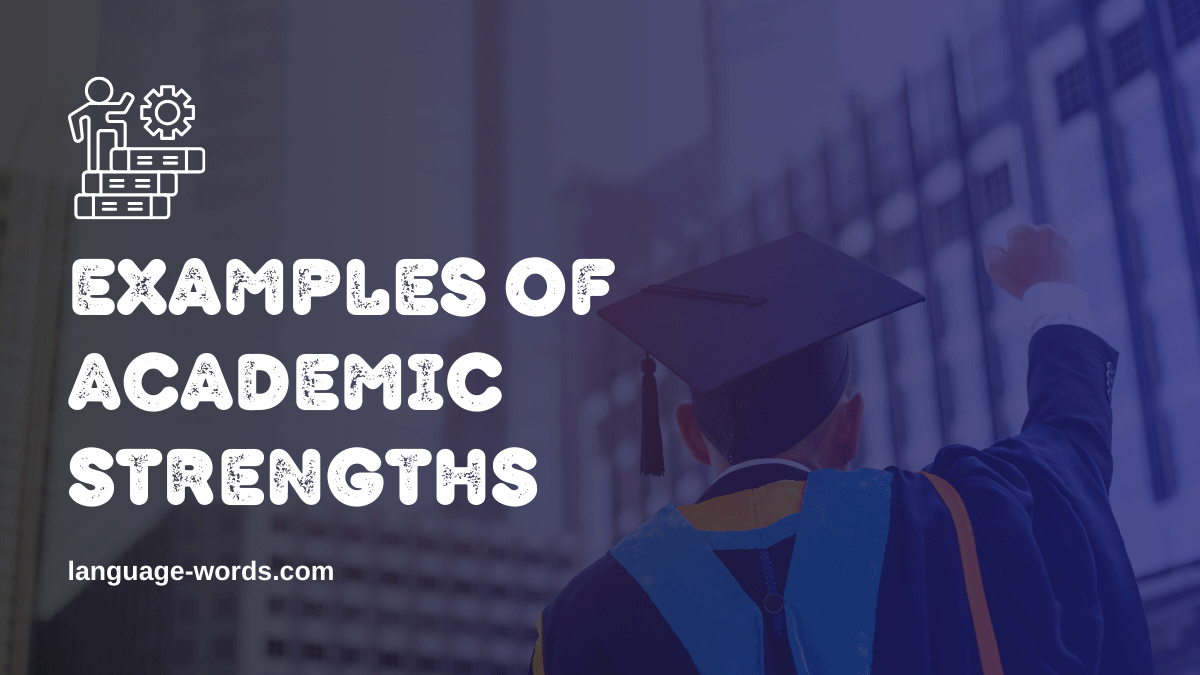As a seasoned academic, I’ve come across countless students who have unique strengths that set them apart in their academic pursuits. In this article, I’ll be exploring some of the most common examples of academic strengths that students possess. Whether you’re a student looking to identify your own strengths or an educator seeking to understand your students better, this article will provide valuable insights into the diverse range of academic strengths that exist.
Definition List For Examples of academic strengths
When it comes to academic strengths, there are a diverse range of qualities that students can possess, setting them apart in their academic pursuits. These strengths can play a significant role in shaping a student’s educational journey and future success. In this section, I will explore some common examples of academic strengths that students may exhibit:

- Critical thinking: Critical thinking is the ability to analyze, evaluate, and interpret information objectively. Students with strong critical thinking skills are able to effectively identify patterns, evaluate evidence, and form logical conclusions. This skill enables them to excel in various subjects, including problem-solving, mathematics, and scientific reasoning.
- Effective communication: Effective communication is essential in both academic and professional settings. Students who possess strong communication skills can express their thoughts and ideas clearly and concisely in both written and verbal forms. These individuals are often confident presenters, active listeners, and persuasive writers.
- Time management: Time management is a valuable skill that helps students effectively prioritize tasks, meet deadlines, and juggle multiple responsibilities. Students who excel in time management can stay organized, avoid procrastination, and make the most of their study and learning opportunities.
- Research skills: Research skills are crucial for academic success, as they enable students to gather, evaluate, and synthesize information from various sources. Students with strong research skills can effectively navigate databases, conduct thorough investigations, and support their arguments with credible evidence.
- Creativity: Creativity is a valuable academic strength that allows students to think outside the box and come up with innovative solutions. Creative individuals often excel in subjects such as art, music, writing, and problem-solving, as they can approach tasks from unique and imaginative perspectives.
- Resilience: Resilience is the ability to bounce back from setbacks and persevere in the face of challenges. Students with strong resilience can maintain a positive attitude, adapt to change, and navigate difficult situations with determination.
By recognizing and nurturing these academic strengths in students, educators can better support and guide them toward achieving their full potential. These examples provide a glimpse into the wide range of strengths that students may exhibit, highlighting the importance of embracing and celebrating their unique abilities.
The Importance of Academic Strengths
As an educator, I believe that recognizing and nurturing academic strengths in students is vital for their success. These strengths not only set students apart in their academic pursuits but also equip them with the essential skills they need to thrive in their personal and professional lives. Let’s explore why academic strengths are important:

- Achieving Academic Excellence: By taking advantage of their strengths, students can excel academically. Whether it’s critical thinking, effective communication, or research skills, these strengths enable students to not only understand complex concepts but also articulate their ideas effectively, resulting in higher grades and a deeper understanding of the subject matter.
- Building Self-Confidence: When students recognize their academic strengths, they develop a sense of confidence in their abilities. This self-confidence plays a crucial role in their overall academic journey, motivating them to take on challenges, embrace new opportunities, and overcome obstacles with resilience and determination.
- Enhancing Problem-Solving Skills: Academic strengths such as critical thinking and creativity enhance students’ ability to solve problems effectively. These skills allow students to approach challenges from different angles, think outside the box, and come up with innovative solutions. This not only benefits them in the classroom but also prepares them for the complex problems they may face in their future careers.
- Developing a Lifelong Love for Learning: When students discover their academic strengths, they are more likely to enjoy the learning process. By focusing on their areas of proficiency, students can find joy and passion in their studies, which fosters a lifelong love for learning and intellectual curiosity that goes beyond the classroom.
- Preparing for Future Success: Academic strengths are not limited to the academic realm. These skills also translate into real-world success. Whether it’s effective communication in the workplace, time management in personal or professional settings, or critical thinking in decision-making, the skills students develop through nurturing their academic strengths are highly transferable and valuable for future endeavors.
Recognizing and nurturing academic strengths in students is paramount for their academic success and overall development. By understanding and celebrating their unique strengths, educators can foster a positive learning environment that empowers students to reach their full potential.
Developing Academic Strengths

Setting Clear Goals
When it comes to developing academic strengths, setting clear goals is key. By clearly defining what you want to achieve, you give yourself a clear direction and purpose. Whether it’s acing a test, completing a challenging project, or improving your overall academic performance, setting specific, measurable goals can help you stay focused and motivated.
To set clear goals, start by analyzing your strengths and weaknesses. Identify the areas where you excel and the areas where you need improvement. Then, set specific, achievable goals that align with those areas. For example, if you struggle with time management, your goal might be to complete your assignments on time and without rushing. By setting clear goals, you give yourself a roadmap to success.
Time Management Skills
Effective time management is crucial for developing academic strengths. Being able to manage your time efficiently allows you to prioritize tasks, avoid procrastination, and make the most of your study sessions. When you manage your time well, you can maintain a healthy balance between your academic responsibilities and other aspects of your life.
To improve your time management skills, start by creating a schedule or to-do list. Organize your tasks based on their importance and deadline, and allocate dedicated time slots for each task. Be sure to include breaks in your schedule to rest and recharge. Additionally, learn to say “no” to non-essential activities that may interfere with your study time. By effectively managing your time, you’ll be able to make steady progress towards your academic goals.
Effective Study Techniques
Developing academic strengths also requires adopting effective study techniques. Not all study methods are equally effective for everyone, so it’s important to find the techniques that work best for you. Experiment with different strategies and identify the ones that help you retain information, understand complex concepts, and perform well on assessments.
Some effective study techniques include:
- Active reading: Engage with the material by highlighting important information, taking notes, and summarizing key points.
- Flashcards: Create flashcards to review key terms, definitions, and concepts. Quiz yourself regularly to reinforce your understanding.
- Practice problems: Solve practice problems or work on sample questions to improve your problem-solving skills and become familiar with different question formats.
- Group study: Collaborate with classmates to discuss and review the material. Explaining concepts to others helps solidify your understanding.
By incorporating these effective study techniques into your routine, you can strengthen your academic skills and improve your performance in the classroom.
Remember, developing academic strengths is a process that requires dedication and consistent effort. By setting clear goals, managing your time effectively, and adopting effective study techniques, you can maximize your potential and achieve academic success. Stay focused, stay motivated, and keep striving for excellence.
Examples of Academic Strengths

Critical Thinking Skills
I believe critical thinking skills are an essential academic strength for students. It involves analyzing information, making logical connections, and evaluating different perspectives. Examples of critical thinking skills include:
- Questioning: Students who possess strong critical thinking skills are curious and ask thought-provoking questions. They seek to uncover deeper meanings and understand multiple perspectives.
- Problem identification: These students can identify problems or challenges within a given situation or task. They are skilled at breaking down complex problems into smaller, manageable parts.
- Analysis: Students with strong critical thinking skills are able to examine information, data, or evidence objectively. They can draw meaningful conclusions based on their analysis.
Problem-Solving Skills
Another important academic strength is problem-solving skills. These skills enable students to tackle challenges, find solutions, and overcome obstacles. Examples of problem-solving skills include:
- Creativity: Students who possess strong problem-solving skills tend to be creative in their approach to finding solutions. They think outside the box and come up with innovative ideas.
- Decision-making: These students can weigh different options and make informed decisions. They consider the pros and cons and choose the best course of action.
- Persistence: Students with strong problem-solving skills are determined and don’t give up easily. They are willing to put in the effort and try different strategies until they find a solution.
Reading Comprehension Skills
I consider reading comprehension skills to be a crucial academic strength for students. It involves understanding and interpreting written text. Examples of reading comprehension skills include:
- Vocabulary: Students who possess strong reading comprehension skills have a wide range of vocabulary. They can understand and use complex words and phrases in context.
- Inferencing: These students can draw logical conclusions and make inferences based on the information provided in the text.
- Critical evaluation: Students with strong reading comprehension skills can critically evaluate the content they read. They can separate fact from opinion and identify biases or misleading information.
Critical thinking skills, problem-solving skills, and reading comprehension skills are just a few examples of the many academic strengths that students can develop. These strengths not only contribute to their academic success but also prepare them for future challenges in their personal and professional lives. By nurturing and celebrating these strengths, educators can empower students to reach their full potential.
How Academic Strengths Benefit Students
As an experienced educator, I’ve witnessed firsthand the incredible impact that recognizing and nurturing academic strengths can have on students. By fostering these strengths, we not only contribute to their success in the classroom but also prepare them for future challenges in their personal and professional lives. In this section, I’ll delve into some concrete examples of how academic strengths benefit students.

Higher Quality Work
When students have strong academic strengths, they are able to produce higher quality work across all subjects. Here’s how:
- Critical Thinking Skills: Students with strong critical thinking skills are able to analyze, evaluate, and synthesize information effectively. This allows them to explore complex concepts, identify patterns, and come up with innovative solutions. As a result, their work stands out for its depth of thought and originality.
- Problem-Solving Skills: Students who excel in problem-solving have the ability to approach challenges with a strategic mindset. They are adept at breaking down problems, identifying possible solutions, and evaluating their effectiveness. This enables them to tackle difficult tasks and find creative ways to overcome obstacles, leading to impressive outcomes.
- Reading Comprehension Skills: Strong reading comprehension skills are essential for understanding and interpreting written information. Students with these skills are able to extract key details, make connections, and draw conclusions from texts. As a result, their work demonstrates a deep understanding of the material, with well-supported arguments and insightful analysis.
Improved Test Performance
Academic strengths also play a significant role in improving students’ performance on tests. Here’s how:
- Critical Thinking Skills: Tests often require students to critically analyze information, evaluate options, and make informed decisions. Students with strong critical thinking skills excel in this regard, as they are able to approach questions thoughtfully and make reasoned choices. This leads to higher test scores and a deeper understanding of the material.
- Problem-Solving Skills: Many tests present students with complex problems that require logical reasoning and creative thinking to solve. Students with strong problem-solving skills thrive in these situations, as they can quickly identify the best approach and apply the necessary strategies to arrive at the correct answers. As a result, they perform exceptionally well on tests that involve problem-solving tasks.
- Reading Comprehension Skills: Tests often assess students’ ability to comprehend and analyze written passages. Students with strong reading comprehension skills excel in these areas, as they can quickly understand the author’s main points, identify important details, and make accurate inferences. This leads to higher scores on tests that include reading comprehension sections.
Increased Confidence
Academic strengths have a profound impact on students’ confidence levels. Here’s how:
- Critical Thinking Skills: When students possess strong critical thinking skills, they approach challenges with confidence. They trust their ability to assess situations, make informed decisions, and defend their viewpoints. This confidence not only impacts their academic work but also extends to their personal and professional lives.
- Problem-Solving Skills: Students with strong problem-solving skills are more likely to tackle difficult tasks with confidence. They believe in their ability to find creative solutions, overcome obstacles, and achieve success. This self-assurance translates into a greater willingness to take on challenges and persevere, both academically and beyond.
- Reading Comprehension Skills: When students have strong reading comprehension skills, they feel more confident in their ability to understand and engage with written material. This confidence allows them to actively participate in classroom discussions, express their ideas effectively, and engage in critical dialogue with their peers.
Academic strengths provide students with a solid foundation for success, both in and out of the classroom. By nurturing these strengths, educators can empower students to reach their full potential and become confident, independent learners. In the next section, I’ll provide some practical strategies for educators to recognize and celebrate these strengths.
Conclusion
Recognizing and nurturing academic strengths is crucial for students’ success. In this article, we explored three specific strengths: critical thinking skills, problem-solving skills, and reading comprehension skills. These strengths have far-reaching benefits, including improving the quality of students’ work, enhancing their test performance, and boosting their confidence.
By nurturing these strengths, we not only contribute to students’ academic success but also prepare them for future challenges in their personal and professional lives. These skills are essential for navigating the complexities of the modern world, where critical thinking, problem-solving, and reading comprehension are highly valued.
In the next section, we will provide practical strategies for educators to recognize and celebrate these strengths. By implementing these strategies, educators can create an environment that fosters the growth of academic strengths and empowers students to reach their full potential.
Remember, every student has unique strengths, and by acknowledging and supporting these strengths, we can help them excel academically and thrive in all areas of their lives.

